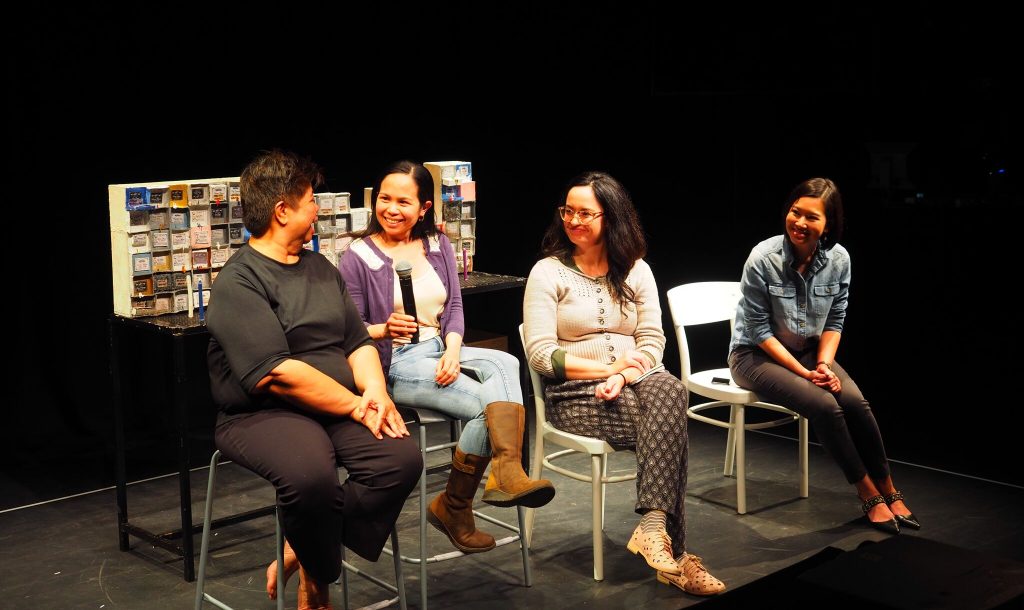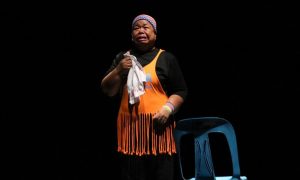This post is part of a series of short reviews of Tao Po, a one-person play that grapples with the Philippines’ “war on drugs”. Read Emerson M. Sanchez’s introduction here.
I thought I had already read and seen a lot about Philippine President Rodrigo Duterte’s War on Drugs, but watching the play Tao Po (Is Anybody Home?) at the Street Theatre in Canberra was a new and uncomfortably intimate immersion in the human lives at the forefront of this conflict.
The format of a theatre performance is not for mass circulation. Unlike viral human rights campaigns or documentaries that speaks to a large audience, theatre offers proximity to a select audience. Tao Po does this through a minimalist setting, engaging the audience through staging and script elements, and having a talkback session after the performance. Without the barrier of a computer or television screen, it is almost as if we are brought geographically there – right in the streets where blood runs and cameras click to capture the gory scenes.
We are drawn into the lives of four characters, each with a separate monologue, portrayed by performance activist Mae Paner (also known as Juana Change).
We, the audience, were directly addressed in the first monologue as students in a journalist’s seminar. In the next monologue, we were dancers in a widowed zumba instructor’s session, as she also hallucinated and addressed us as her gunned-down family members. In the third monologue, a contract killer talks to us conspiratorially as voices in his head, only to change his tone when he reveals himself as also being a policeman who addresses us as the media. Only once were we explicitly removed from the setting – in the final monologue, when we as the audience feel truly helpless as a little girl lights candles in a cemetery in honour of her parents and others who died in the drug war.
The Q&A at the end of the play continues the play’s intimacy and humanising theme. The walls of Tao Po serve as a better platform for discourse and debate than any Facebook page. Social media can encourage socio-political binaries and can be nerve centres in the spreading of unsubstantiated news and violently-expressed political dogma. These online discussions can be intentionally or unintentionally removed from the lives lost in the drug war and its social costs.
Within the bounds of the stage, our proximity to the drug war is reinforced not only in how the personal narratives of real-life people were presented, but also in how those who support the drug war are invited to express themselves as real-life people. Paner said that she wants more people who identify as pro-Duterte to watch the play, as this last section would allow various perspectives on the drug war to be better understood.
By drawing us into each monologue, the play made us characters in the story. The talkback session brought us back into our reality as humans with different perspectives on the drug war but, hopefully, with the capacity to understand each other better. The overall feeling of intimacy imparted by the play in its entirety made me feel uncomfortable, given my geographical and privileged distances from the drug war. But this was a purposeful discomfort, which powerfully challenged me to reflect on what I know about the drug war and prodded me stop being so “removed” as to what I can do for those affected.
Tao Po is about finding the humanity in such troubled times in Duterte’s Philippines, and closing the gaps that divide us so we can manifest that humanity. The play brings us closer together, through intimacy between the character and audience, and openness to meaningful conversation and personal narratives. We are discomforted into remembering, not just the deaths of those in this war, but of the lives left behind—ours, as audience, included.
In the end, we are asked Tao Po (Is Anybody Home?) and whether we will continue remaining mere audience to this war.
 Facebook
Facebook  Twitter
Twitter  Soundcloud
Soundcloud  Youtube
Youtube  Rss
Rss 



